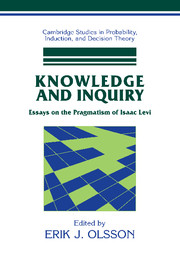Book contents
- Frontmatter
- Contents
- List of Contributors
- Preface
- Introduction: The Pragmatism of Isaac Levi
- 1 Isaac Levi and His Pragmatist Lineage
- 2 Is Pragmatist Truth Irrelevant to Inquiry?
- 3 The Knowledge Business
- 4 Infallibility and Incorrigibility
- 5 Why Inconsistency Is Not Hell: Making Room for Inconsistency in Science
- 6 Levi on Risk
- 7 Vexed Convexity
- 8 Levi's Chances
- 9 Isaac Levi's Potentially Surprising Epistemological Picture
- 10 Isaac Levi on Abduction
- 11 Potential Answers – To What Question?
- 12 Levi and the Lottery
- 13 The Value of Truth and the Value of Information: On Isaac Levi's Epistemology
- 14 Decision-Theoretic Contraction and Sequential Change
- 15 Deciding What You Know
- 16 Levi's Ideals
- 17 The Mind We do Not Change
- 18 Psychoanalysis as Technology
- 19 Levi on Money Pumps and Diachronic Dutch Books
- 20 Levi on the Reality of Dispositions
- 21 Replies
- Index
- References
12 - Levi and the Lottery
Published online by Cambridge University Press: 05 March 2010
- Frontmatter
- Contents
- List of Contributors
- Preface
- Introduction: The Pragmatism of Isaac Levi
- 1 Isaac Levi and His Pragmatist Lineage
- 2 Is Pragmatist Truth Irrelevant to Inquiry?
- 3 The Knowledge Business
- 4 Infallibility and Incorrigibility
- 5 Why Inconsistency Is Not Hell: Making Room for Inconsistency in Science
- 6 Levi on Risk
- 7 Vexed Convexity
- 8 Levi's Chances
- 9 Isaac Levi's Potentially Surprising Epistemological Picture
- 10 Isaac Levi on Abduction
- 11 Potential Answers – To What Question?
- 12 Levi and the Lottery
- 13 The Value of Truth and the Value of Information: On Isaac Levi's Epistemology
- 14 Decision-Theoretic Contraction and Sequential Change
- 15 Deciding What You Know
- 16 Levi's Ideals
- 17 The Mind We do Not Change
- 18 Psychoanalysis as Technology
- 19 Levi on Money Pumps and Diachronic Dutch Books
- 20 Levi on the Reality of Dispositions
- 21 Replies
- Index
- References
Summary
It is as rational to accept the hypothesis that ticket i will not win as it is to accept any statistical hypothesis that I can think of.
Henry E. KyburgIt is as rational to suspend judgement regarding the outcome of a fair lottery as it is to suspend judgement in any case I can think of.
Isaac LeviINTRODUCTION
Consider a lottery of 1,000,000 tickets where there is one and only one winner and where one ticket is as likely as any other to be the winner. In this sort of scenario it is extremely improbable that any given ticket will win. The probability that a given ticket will lose is as high as that of any statistical hypothesis one can think of. If we are ever allowed to accept a hypothesis as true, then surely we are allowed to accept, of any given ticket, that it will lose. But to accept, for each ticket, that it will lose is to commit oneself to there being no winning ticket. This contradicts our background knowledge that there is a winning ticket. It seems, then, that common sense gives us a license for holding contradictory beliefs.
The lottery paradox, first formulated by Henry Kyburg, is still a hotly disputed subject that is thought to have all sorts of radical consequences for human inquiry. Kyburg saw it as an argument for cultivating a tolerance for inconsistency and against demanding logical closure of a rational agent's beliefs.
- Type
- Chapter
- Information
- Knowledge and InquiryEssays on the Pragmatism of Isaac Levi, pp. 167 - 178Publisher: Cambridge University PressPrint publication year: 2006



